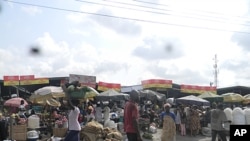There is an influx of fake goods on Ghana’s markets, with some claiming to possess miraculous healing qualities. Ghana’s Food and Drugs Board, which certifies and licenses products, has refuted such claims, saying lack of education and vigilance on the part of consumers may be encouraging the makers and sellers of such products.
Substandard goods sold
The goods in question are said to be either substandard, lacking essential ingredients listed on the labels or are imitations of recognized brands. Ghana Food and Drugs Board communications chief James Lartey says the fake goods include anti-malaria drugs and antibiotics.
Products said to have healing abilities include undergarments imported into the country by a Chinese company licensed to deal in food supplements.
“They imported some panties, brassieres and cups. According to them, these panties can deal with prostate cancer, the brassiere can deal with breast cancer, the cup when you put water in it and drink can deal with Type-1 and Type-2 diabetes. But these things are false," said Lartey.
That is not all. Some local alcoholic beverages laced with Indian hemp are alleged to have sexual enhancement properties. Then there are fake sanitary pads which are said to cure hypertension when soaked in water and the liquid drank by patients. Other products include life extension machines.
Exposing counterfeit, expired goods
Lartey says none of these products have been evaluated or registered by the Food and Drugs Board.
Trade in fake goods is said to be growing worldwide, but Africa has been identified as a special case. Besides the goods available to consumers, the World Customs Organization said Africa is being used as transit route for such goods intended for markets in Europe and America.
Lartey says it will take vigilance on the part of consumers to expose fake medicines and cures. Unfortunately, consumer watchdog groups are either nonexistent in some countries or dormant in others.
“The Ghanaian will walk into a shop and buy. He will not even look at expiration date. He will just eat or drink it," he explained. "When there is a problem before he goes and refers what is on the bottle; whether it has expired."
Consumer Protection Organization executive director Jean Lucaz agrees. He says some shop owners unintentionally leave expired products on their shelves.
“Well, they sell until somebody complains and people have been buying. So when you check they think, 'Did you just come back from abroad?' I do not understand why it is attributed to living abroad and not doing the right thing," he stated.
He says that behavior contributes to a culture of apathy among Ghanaians and fails to put responsible government agencies on their toes.
“Ghanaians generally shy away from complaining. And most of these agencies cannot take any action unless they receive complaints because they are not on the market. If they receive complaints on a particular product, then they can go where the complaints are coming from and do something about it," said Lucaz.
Consumer watchdog group, one solution
But lack of effective consumer watchdog groups is hampering public education in that regard. Jean Lucaz says the situation may largely be due to absence of donor support for consumer advocacy. His organization functions mainly on a blog and has a small following among educated consumers.
Lucaz says a lasting solution could be attained through legal reforms. Ghana already has legislation dealing with consumer protection issues. But he says the country needs a more comprehensive law regulating production, advertisement and sale of goods, along with stiffer punishment for those who violate it.




